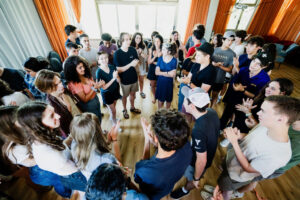Sharing ideas for engaging with Jewish young adults in this difficult time
 Adapted from an email sent on October 20, 2023.
Adapted from an email sent on October 20, 2023.
A Message to Jewish Educators:
As many colleagues in our field have so eloquently noted in the past few days, this time of mourning and distress is one of great importance and sensitivity for Jewish young adults. Each of us can help create an environment for young people that reinforces Jewish community at a time when it is most needed.
I’m writing to provide you with some insights and tips that we at The Bronfman Fellowship have gleaned over the past week, which we hope will further support you in your work with young people. We would also appreciate learning from you at this critical time and welcome your feedback.
Context: Engaging with Young Adults from Diverse Backgrounds and Experiences
This past weekend we connected with 75+ members of our Bronfman North American community between the ages of 16-24, in virtual and in-person small group settings. The participants were from all over the country and come from a wide range of Jewish settings and backgrounds, as well as a broad spectrum of political and ideological viewpoints.
Educator Preparation for Bringing Young People Together
Before these convenings, we worked with our educational team and mental health advisors to develop best practices for open and supportive conversations that are developmentally appropriate for young adults. Here are some of the tips we found most useful:
- Open with some kind of grounding exercise: a short melody (e.g. a niggun or easy-to-learn song), or breathing exercises. Return to these tools for self-compassion and emotional regulation when conversations get too hot.
- If the participants don’t have a pre-existing relationship, it can help to establish some group communication commitments or guidelines. (Here are the ones we use at The Bronfman Fellowship.)
- If the group is mixed in political viewpoints or affiliations, it may help to start with an opening question or activity that helps get folks into an “us” mindset — e.g., inviting a story from each individual of a moment in which they felt connected to other Jewish people this past week.
- Encourage pauses to allow space to take in what others are sharing. This supports resilient listening and helps manage the pace of the conversation.
- Name the emotional range present in the room, making sure to recognize strong feelings as well as feelings of disconnection or ambivalence. Acknowledge that everyone is coming in with different contexts and realities. This reinforces that many emotions and reactions can coexist in one group, and that they are acceptable and respected.
- Offer insights from brain science, such as that heightened emotions can lead to more extreme statements or reactions. We should try to be mindful of our nervous system and emotional state as we listen and share with others.
- Remind everyone that we need to take care of one another and, if appropriate, ask the group for examples of how they have felt cared for in the last week around this issue.
Key Takeaways: What We Observed/ Heard
- Safe Community. Jewish students want spaces for Jewish community that are not exclusively marked by political discourse or rallies right now. They crave space for caring, for “catching their breath,” for accessing Jewish wisdom, and for pluralism without in-fighting.
- Tools for Responding. Jewish students are being asked to have all the answers and speak for Israel. While it’s important for students to have access to accurate and clear historical information, they also need support and encouragement on how to speak personally regarding what they value about Judaism and Israel, without feeling like they have to answer for all of Israel’s policies.
- Mental Health/Stress. Students are overwhelmed; they need to be reminded that feeling calmer and enjoying oneself is actually a way towards helping and healing.
- Identity. Students are grappling with an increased awareness of their Jewish identity and a desire to more publicly display their Jewishness. Those students who do not have personal ties to Israel are particularly struggling to make sense of this moment as a Jewish moment.
- Isolation. Students in public and non-sectarian private school settings have shared a feeling of being unseen or unrecognized by staff, administration and peers.
- Guilt. Despite the heaviness of the current moment, students are also still juggling academic demands, extra-curriculars, the college process, and applying for jobs and internships. They feel guilty that life continues here in America even as it’s far from a time of normalcy.
After this past weekend, we have launched a number of ways to help keep our young alumni connected and supported, including:
- Weekly zoom sessions for processing and support.
- Access to “office hours” with staff for advice, guidance, and mentorship.
- Providing small stipends for students to host their own pluralistic gatherings on their campuses or in their communities, such as by hosting a meal, study session, discussion, song circle, art experience, etc.
- Connections to resources and ways to help.
We are redoubling our commitment to nurturing Jewish youth leadership and are currently recruiting for our 2024 cohort. The need to build a vibrant and diverse Jewish community, develop leadership in the Jewish world and beyond, and help teens connect deeply with the Jewish experience and people in Israel and America is more important than ever. Please nominate Jewish 11th-graders here, and encourage those in your community to learn more and apply at bronfman.org.
Wishing you and your loved ones safety and healing. Shabbat Shalom,
Becky Voorwinde
CEO
P.S. Our application deadline is December 4, 2023. Here’s the link again. Thank you for helping to spread the word.
 Adapted from an email sent on October 20, 2023.
Adapted from an email sent on October 20, 2023.